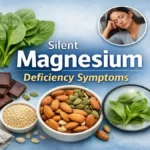Introduction: The Hidden Danger of Silent Heart Attacks
When people hear the term “heart attack,” they usually imagine someone falling over and clutching their chest. However, in reality, many heart attacks occur silently—without any obvious signs. These are called silent heart attacks, and they can be just as deadly as a regular heart attack. Understanding the silent symptoms of heart attack can be lifesaving, especially for people at high risk.
Unlike a common heart attack, the subtle signs of a silent heart attack are often misinterpreted as common health problems like fatigue or indigestion. Hence, it is very important to pay attention to your body. Through this article, we will discuss 10 major silent symptoms of heart attack that you should not ignore.
Why Silent Symptoms of Heart Attack Are Often Ignored
Most people associate a heart attack with sharp chest pain, but silent symptoms of heart attack often go unnoticed because they are mild or seem like everyday problems. For example, feeling unusually tired or having indigestion may seem harmless, but they can also be warning signs.
Many patients report experiencing symptoms days or weeks before a heart attack but fail to take them seriously. The silent nature of these symptoms makes it easy to delay seeking help, increasing the risk of damage to the heart muscle. Therefore, recognizing these symptoms is the first step towards prevention and timely medical attention.
Who Is Most at Risk of Silent Heart Attacks?
Not everyone experiences the silent symptoms of heart attack in the same way. Some people are more likely to have these silent warning signs that are easy to recognize:
- Diabetics: High blood sugar levels can damage nerves, reducing the sensation of pain.
- Older adults: Age can dull the ability to detect physical distress.
- Women, especially postmenopausal women, often experience symptoms differently than men.
- People with high blood pressure or obesity: These conditions contribute to heart disease, making silent symptoms more likely.
If you fall into any of these categories, it is important to pay extra attention to even minor physical changes, as they could point to a silent heart attack.
According to the experts at Mayo Clinic, many silent symptoms of heart attack go unnoticed due to their subtle nature.
Top 10 Silent Symptoms of Heart Attack
Let’s break down the most common yet often overlooked silent symptoms of heart attack that may occur without chest pain.
1. Mild Chest Discomfort or Pressure
Instead of sharp chest pain, you may feel a slight pressure, fullness, or tightness in your chest. This pressure may subside or last for a few minutes. People often mistake it for heartburn or a muscle strain.
This is one of the most commonly overlooked symptoms of heart attack because it does not cause severe pain. However, even mild chest discomfort should never be ignored, especially if it is new or unusual for you.
2. Unexplained Fatigue or Weakness
Feeling extremely tired without any clear reason can be a red flag. If you’re suddenly too exhausted to do everyday tasks—like climbing stairs or walking short distances – it could be one of the silent symptoms of heart attack.
This is especially true for women, who often complain of fatigue weeks before a cardiac event. Your heart may be struggling to pump blood efficiently, and fatigue is your body’s cry for help.
3. Shortness of Breath Even at Rest
Difficulty breathing without exertion is a serious warning. If you’re having trouble breathing while sitting or lying down, your heart may not be pumping enough oxygen-rich blood.
This is a classic silent symptom of heart attack that often gets overlooked, especially in elderly individuals or people with asthma. If shortness of breath appears suddenly or worsens, it’s critical to get checked immediately.
4. Lightheadedness or Dizziness
Fainting, feeling dizzy, or fainting can be a sign of reduced blood flow to the brain. When the heart is in trouble, it prioritizes pumping blood to vital organs, and your brain can suffer the consequences.
This kind of dizziness, especially when combined with other silent symptoms of heart attack, should not be taken lightly.
5. Sweating Without Physical Activity
Abnormal sweating—especially cold sweat—is the body’s way of signaling heart trouble. You may sweat even if you’re not moving or in a cold environment.
This is one of the sneakiest silent symptoms of heart attack because sweating can also be due to stress or heat. However, if it’s happening randomly and is accompanied by other signs like chest pressure or fatigue, seek help immediately.
6. Nausea or Indigestion
Many people confuse nausea, stomach discomfort, or indigestion with digestive issues. But persistent stomach upset could also be a silent symptom of heart attack, especially if it doesn’t improve with antacids or dietary changes.
This symptom is more common in women, and it can appear suddenly or gradually. Never ignore nausea without an apparent reason, especially when it is accompanied by fatigue or sweating.
7. Pain in the Jaw, Neck, or Back
Pain that radiates to the jaw, neck, upper back, or shoulders may not seem heart-related, but it can be a sign of a serious problem. The nerves to your heart and upper body are connected, and the pain can radiate.
This radiating discomfort is a known silent symptom of heart attack, and it’s more frequent in women. The pain might be sharp or dull, constant or intermittent.
8. Irregular Heartbeat or Palpitations
Feeling your heart race, flutter, or skip a beat for no obvious reason can be a warning sign. Irregular heartbeat might seem harmless, but when associated with other silent symptoms of heart attack, it becomes more serious.
If these palpitations are frequent or are accompanied by dizziness or weakness, it could be a sign that your heart is under pressure and needs immediate medical attention.
9. Sleep Disturbances or Insomnia
Many people with silent heart attacks report unusual sleep disturbances. This may include difficulty falling asleep, waking up frequently, or feeling restless at night.
Sleep problems may seem minor, but persistent insomnia can be a silent symptom of heart attack, especially when your body is under stress. Listen to your body — poor sleep could mean your heart is struggling.
10. Anxiety or Feeling of Impending Doom
One of the most eerie silent symptoms of heart attack is a sudden, unexplained sense of anxiety or dread. Many survivors recall feeling that something was “just not right” before the attack.
This is often the body’s instinctive response to danger. If you are experiencing extreme anxiety that is unreasonable and is accompanied by any of the other symptoms mentioned above, don’t ignore it.
When to Take Silent Symptoms Seriously
If you experience even the slightest of the above silent symptoms of heart attack, take them seriously. Don’t wait until you have chest pain or fainting. Heart tissue can be damaged in a matter of minutes, and timely treatment can make a big difference.
If symptoms last more than a few minutes or occur frequently, call emergency services or go to the nearest hospital. If you feel dizzy or have trouble breathing, do not try to drive yourself.
How to Diagnose a Silent Heart Attack
Silent heart attacks are typically discovered after the fact through:
- Electrocardiogram (ECG): Detects changes in heart rhythm
- Blood tests (Troponin): Reveal heart muscle damage
- Echocardiogram: Visualizes heart function
- Stress test: Assesses heart under physical exertion
If you’re experiencing ongoing silent symptoms of heart attack, a cardiologist can perform these tests to rule out or confirm heart damage.
To explore more medically reviewed information on silent symptoms of heart attack, visit the American Heart Association.
How to Prevent Silent Heart Attacks
Prevention is always better than treatment. Here’s how to reduce your risk:
- Exercise regularly and maintain a healthy weight
- Control blood pressure and cholesterol
- Manage diabetes properly
- Quit smoking and limit alcohol
- Get regular heart checkups
By making heart-healthy choices, you reduce the likelihood of experiencing even silent symptoms of heart attack.
Conclusion: Listen to Your Body—It Could Save Your Life
Silent symptoms of heart attack are often ignored or misinterpreted, leading to delayed treatment and permanent damage. But by educating yourself and being alert, you can catch the signs early and get the help you need.
Share this knowledge with your loved ones – it might just save someone’s life.
FAQs: Silent Symptoms of Heart Attack
Q1: Can a silent heart attack go away on its own?
No, it may not cause dramatic symptoms but still causes permanent damage to the heart muscle.
Q2: Are silent symptoms more common in women?
Yes, women are more likely to experience fatigue, indigestion, and anxiety during a heart attack. Q3: Can anxiety mimic heart attack symptoms?
Yes, but if in doubt, always treat it as a medical emergency until ruled out.






